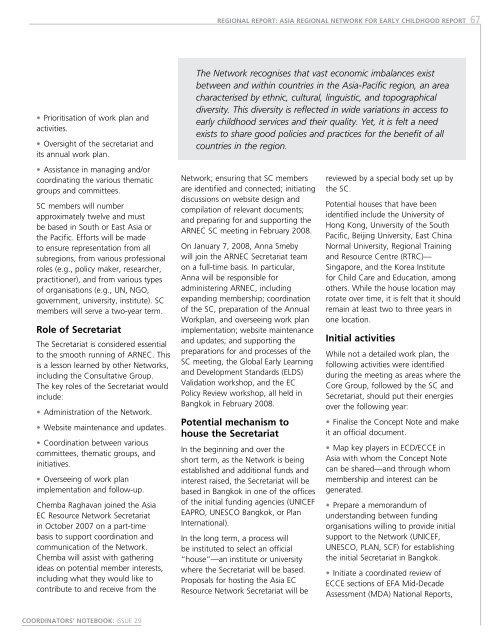A global call to action for early childhood
A global call to action for early childhood
A global call to action for early childhood
Create successful ePaper yourself
Turn your PDF publications into a flip-book with our unique Google optimized e-Paper software.
REGIONAL REPORT: Asia Regional Network <strong>for</strong> Early Childhood report<br />
67<br />
• Prioritisation of work plan and<br />
activities.<br />
• Oversight of the secretariat and<br />
its annual work plan.<br />
• Assistance in managing and/or<br />
coordinating the various thematic<br />
groups and committees.<br />
SC members will number<br />
approximately twelve and must<br />
be based in South or East Asia or<br />
the Pacific. Ef<strong>for</strong>ts will be made<br />
<strong>to</strong> ensure representation from all<br />
subregions, from various professional<br />
roles (e.g., policy maker, researcher,<br />
practitioner), and from various types<br />
of organisations (e.g., UN, NGO,<br />
government, university, institute). SC<br />
members will serve a two-year term.<br />
Role of Secretariat<br />
The Secretariat is considered essential<br />
<strong>to</strong> the smooth running of ARNEC. This<br />
is a lesson learned by other Networks,<br />
including the Consultative Group.<br />
The key roles of the Secretariat would<br />
include:<br />
• Administration of the Network.<br />
• Website maintenance and updates.<br />
• Coordination between various<br />
committees, thematic groups, and<br />
initiatives.<br />
• Overseeing of work plan<br />
implementation and follow-up.<br />
Chemba Raghavan joined the Asia<br />
EC Resource Network Secretariat<br />
in Oc<strong>to</strong>ber 2007 on a part-time<br />
basis <strong>to</strong> support coordination and<br />
communication of the Network.<br />
Chemba will assist with gathering<br />
ideas on potential member interests,<br />
including what they would like <strong>to</strong><br />
contribute <strong>to</strong> and receive from the<br />
The Network recognises that vast economic imbalances exist<br />
between and within countries in the Asia-Pacific region, an area<br />
characterised by ethnic, cultural, linguistic, and <strong>to</strong>pographical<br />
diversity. This diversity is reflected in wide variations in access <strong>to</strong><br />
<strong>early</strong> <strong>childhood</strong> services and their quality. Yet, it is felt a need<br />
exists <strong>to</strong> share good policies and practices <strong>for</strong> the benefit of all<br />
countries in the region.<br />
Network; ensuring that SC members<br />
are identified and connected; initiating<br />
discussions on website design and<br />
compilation of relevant documents;<br />
and preparing <strong>for</strong> and supporting the<br />
ARNEC SC meeting in February 2008.<br />
On January 7, 2008, Anna Smeby<br />
will join the ARNEC Secretariat team<br />
on a full-time basis. In particular,<br />
Anna will be responsible <strong>for</strong><br />
administering ARNEC, including<br />
expanding membership; coordination<br />
of the SC, preparation of the Annual<br />
Workplan, and overseeing work plan<br />
implementation; website maintenance<br />
and updates; and supporting the<br />
preparations <strong>for</strong> and processes of the<br />
SC meeting, the Global Early Learning<br />
and Development Standards (ELDS)<br />
Validation workshop, and the EC<br />
Policy Review workshop, all held in<br />
Bangkok in February 2008.<br />
Potential mechanism <strong>to</strong><br />
house the Secretariat<br />
In the beginning and over the<br />
short term, as the Network is being<br />
established and additional funds and<br />
interest raised, the Secretariat will be<br />
based in Bangkok in one of the offices<br />
of the initial funding agencies (UNICEF<br />
EAPRO, UNESCO Bangkok, or Plan<br />
International).<br />
In the long term, a process will<br />
be instituted <strong>to</strong> select an official<br />
“house”—an institute or university<br />
where the Secretariat will be based.<br />
Proposals <strong>for</strong> hosting the Asia EC<br />
Resource Network Secretariat will be<br />
reviewed by a special body set up by<br />
the SC.<br />
Potential houses that have been<br />
identified include the University of<br />
Hong Kong, University of the South<br />
Pacific, Beijing University, East China<br />
Normal University, Regional Training<br />
and Resource Centre (RTRC)—<br />
Singapore, and the Korea Institute<br />
<strong>for</strong> Child Care and Education, among<br />
others. While the house location may<br />
rotate over time, it is felt that it should<br />
remain at least two <strong>to</strong> three years in<br />
one location.<br />
Initial activities<br />
While not a detailed work plan, the<br />
following activities were identified<br />
during the meeting as areas where the<br />
Core Group, followed by the SC and<br />
Secretariat, should put their energies<br />
over the following year:<br />
• Finalise the Concept Note and make<br />
it an official document.<br />
• Map key players in ECD/ECCE in<br />
Asia with whom the Concept Note<br />
can be shared—and through whom<br />
membership and interest can be<br />
generated.<br />
• Prepare a memorandum of<br />
understanding between funding<br />
organisations willing <strong>to</strong> provide initial<br />
support <strong>to</strong> the Network (UNICEF,<br />
UNESCO, PLAN, SCF) <strong>for</strong> establishing<br />
the initial Secretariat in Bangkok.<br />
• Initiate a coordinated review of<br />
ECCE sections of EFA Mid-Decade<br />
Assessment (MDA) National Reports,<br />
COORDINATORS’ NOTEBOOK: ISSUE 29
















